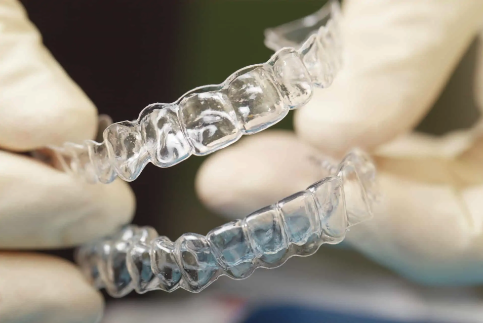Night Guards
Night guards, also known as occlusal guards or mouthguards, are custom-made dental appliances designed to protect teeth from the effects of bruxism (teeth grinding) and temporomandibular joint (TMJ) disorders. Made from soft, flexible materials like acrylic or silicone, night guards are worn over the teeth during sleep to create a cushioning barrier that prevents the upper and lower teeth from grinding against each other.
By reducing pressure on the teeth and jaw joints, night guards alleviate discomfort, prevent dental damage, and promote restful sleep, improving overall oral health and quality of life for individuals affected by bruxism or TMJ disorders.

Did you know that night guards can help alleviate TMJ symptoms by reducing pressure on the jaw joint and muscles during sleep?
Bruxism Troubling You? Schedule Your Appointment for Night Guards.
DIFFERENT TYPES OF NIGHT GUARDS
- Custom-Fit Night Guards
- Over-the-Counter Night Guards
- Hybrid Night Guards
Custom-fit night guards are precision-crafted dental appliances fabricated based on impressions of the patient's teeth. These night guards offer a tailored fit that conforms precisely to the individual's mouth shape and bite, providing optimal comfort and protection. The custom-fit night guards provided by our dentist in Austin, TX, offer several advantages.
Firstly, they provide superior comfort as they are molded to fit the unique contours of the patient's teeth and gums, minimizing interference with speech or breathing during sleep. Secondly, they provide maximum protection against teeth grinding and jaw clenching, reducing the risk of dental damage and discomfort. Additionally, custom-fit night guards are durable, made from high-quality materials, and fabricated with precision, ensuring long-lasting performance and effectiveness.
Did you know that, on average, a custom-made night guard can last between two to five years, while over-the-counter guards may need to be replaced more frequently?
Want to Learn More About Night Guards?

